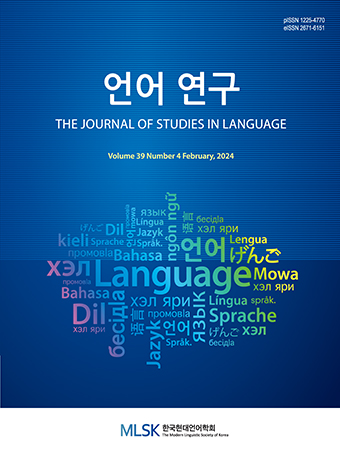Research Article
Abstract
References
Information
This study examines the relationship between vocabulary ability, vocabulary learning strategy (VLS) use and cloze test performance of Korean college students. Eighty participants took a questionnaire about VLS use, a vocabulary test and a multiple choice cloze test. The result shows that ‘meaning finding strategy’ and ‘memory strategy’ were the most frequently used while ‘metacognitive strategy’ was the least. The students’ VLS use was not positively correlated with their vocabulary ability. However their cloze test performance was positively correlated with their vocabulary ability, which suggests that the cloze test could be an effective tool to improve EFL learners’ vocabulary ability.
- 김동규. 2017. EFL 학습자들의 영어 어휘 학습 전략과 영어 능력과의 상관관계. 국제언어문학, 37, 181-206.
- 김미영. 2011. EFL 학습자의 어휘학습 전략과 연어 능력에 관한 연구. 코기토, 69, 485-505.
- 김지선. 2011. 대학생의 어휘력과 어휘학습책략과의 관계. 현대영어교육, 12.3, 230-251.
- 오희정. 2010. 한국 대삭생의 어휘 학습책략 사용. 영어교욱연구, 22.2, 279-302. 10.17936/pkelt.2010.22.2.012
- 유정윤, 이은주. 2017. 어휘 지식 유형과 능숙도에 따른 고등학생의 영어 어휘 학습 전략 사용 분석. 영어교육연구, 22.1, 1-30. 10.22275/SEE.22.1.01
- Alderson, C. 1980. Native and Nonnative Speaker Performance on Cloze Tests. Language Learning 30.1, 59-76. 10.1111/j.1467-1770.1980.tb00151.x
- Bachman, L. F. 1985. Performance on Cloze Tests with Fixed-ratio and Rational Deletions. TESOL Quarterly 19.3, 535-556. 10.2307/3586277
- Bensoussan, M. 1990. Redundancy and the Cohesion Cloze. Journal of Research in Reading 13.1, 18-37. 10.1111/j.1467-9817.1990.tb00320.x
- Brown, H. D. 2001. Principle of Language Learning and Teaching (3rd ed.). Englewood Cliffs, NJ: Prentice-Hall.
- Chai, Z. F., Swanto, S., and Din, W. A. 2020. Variants of Cloze-Test Based Tasks and Vocabulary Achievement. Universal Journal of Education Research 8.7, 2980-2989. 10.13189/ujer.2020.080726
- Chihara, T., Oller, Jr. J. W., Weaver, K., and Chávez-Oller, M. 1977. Are cloze items sensitive to constraints across sentences? Language Learning, 27.1, 63-73. 10.1111/j.1467-1770.1977.tb00292.x
- Fan, Y. 2003. Frequency of Use, Perceived Usefulness, and Actual Usefulness of Second Language Vocabulary Strategies: A Study of Hong Kong Learners. The Modern Language Journal 87.2, 222-242. 10.1111/1540-4781.00187
- Ghalebi, R., Sadighi, F., and Sadegh, M. 2021. A Study of Vocabulary Learning Strategies among High and Low Iranian English Vocabulary Learners. Cogent Education 8.1, 1-10. 10.1080/2331186X.2020.1834933
- Greene, B. B. 2001. Testing Reading Comprehension of Theoretical Discourse with Cloze. Journal of Research in Reading 24.1, 82-98. 10.1111/1467-9817.00134
- Gu, Y. and Johnson, R. 1996. Vocabulary Learning Strategies and Language Learning Outcomes. Language Learning 46.4, 643-679. 10.1111/j.1467-1770.1996.tb01355.x
- Han, M. 2008. Vocabulary Learning Strategy, Vocabulary Ability and English Proficiency of Korean College Students. Saehan English and English Literature 50.2, 243-265. 10.25151/nkje.2008.50.2.012
- Ionin, T., Montrul, S., and Crivos, M. 2012. A Bidirectional Study on the Acquisition of Plural Noun Phrase Interpretation in English and Spanish. Applied Psycholinguistics 34.3, 483-518. 10.1017/S0142716411000841
- Jeon, I. 2007. The Relationship between Korean EFL Learners’ Vocabulary Ability and Vocabulary Learning Strategies. English Teaching 62.1, 31-54. 10.15858/engtea.62.1.200703.31
- Jonz, J. and Oller, Jr. J. W. 1994. A Critical Appraisal of Related Cloze Research. In J. W. Oller, Jr., and J. Jonz (eds.), Cloze and Coherence. London: Associated University Press, 371-407.
- Keshavarz, M. H. and Salimi, H. 2007. Collocational Competence and Cloze Test performance: A Study of Iranian EFL Learners. International Journal of Applied Linguistics 17.1, 81-92. 10.1111/j.1473-4192.2007.00134.x
- Kleijn, S. 2018. Clozing in on Readability: How Linguistic Features Affect and Predict Text Comprehension and Online Processing. Netherlands: LOT Trans 10.
- Lee, M. 2007. Vocabulary Learning Strategies for Success: Profiling Four Korean College Students. Foreign Language Education 14.3, 1-20.
- Lewis, M. 2000. Teaching Collocation: Further Developments in the Lexical Approach. England: Language Teaching Publications.
- Muzumoto, A. and Takeuchi, O. 2009. Examining the Effectiveness of Explicit Instruction of Vocabulary Learning Strategies with Japanese EFL University Students. Language Teaching Research 13.4, 425-449. 10.1177/1362168809341511
- Nation, I. S. P. 2001. Learning Vocabulary in Another Language. Cambridge: Cambridge University Press. 10.1017/CBO9781139524759 PMC90373
- O’Malley, J. M. and Chamot, A. U. 1990. Learning Strategies in Second Language Acquisition. New York: Cambridge University Press. 10.1017/CBO9781139524490
- O’Neill, R., Cornelius, E., and Washburn, G. 1981. American Kernel Lessons: Advanced Students’ Book. New York: Longman Publishing Group.
- Oxford, R. L. 1990. Language Learning Strategies: What Every Teacher Should Know. New York: Newbury House.
- Park, J. 2001. Korean EFL Learners’ Vocabulary Learning Strategies. English Teaching 56.4, 3-30.
- Qian, D. 2008. Investigating the Relationship between Vocabulary Knowledge and Academic Reading Performance: An Assessment Perspective. Language Learning 52.3, 513-536. 10.1111/1467-9922.00193
- Rahimi, M. 2011. Discourse Markers in Argumentative and Expository Writing of Iranian EFL Learners. World Journal of English Language 1.2, 68-78. 10.5430/wjel.v1n2p68
- Rao, Z. 2016. Language Learning Strategies and English Proficiency: Interpretations from Information-processing Theory. The Language Journal 44.1, 90-106. 10.1080/09571736.2012.733886
- Read, J. 2002. Assessing Vocabulary. Cambridge: Cambridge University Press.
- Ryoo, H. 2016. Cohesion and Coherence in Korean EFL Learners’ Spoken Discourse. The Journal of Linguistics Science 79, 95-115. 10.21296/jls.2016.12.79.95
- Schleppegrell, M. 1996. Conjunction in Spoken English and ESL Writing. Applied Linguistics 17.3, 271-285. 10.1093/applin/17.3.271
- Schmitt, N. 1997. Vocabulary Learning Strategies: Current Trends in Teaching Second Language Vocabulary. In N. Schmitt and M. McCarthy (eds), Vocabulary: Description Acquisition and Pedagogy. Cambridge: Cambridge University Press, 199-227.
- Schmitt, N. 2000. Vocabulary in Language Teaching. Cambridge: Cambridge University Press.
- Schmitt, N. 2008. Instructed Second Language Vocabulary Learning. Language Teaching Research 12.3, 329-363. 10.1177/1362168808089921
- Storey, P. 1997. Examining the Test-taking Process: A Cognitive Perspective on the Discourse Cloze Test. Language Testing 14.2, 214-231. 10.1177/026553229701400205
- Wei, M. 2007. An Examination of Vocabulary Learning of College-level Learners of English in China. The Asian EFL Journal 9.2, 93-114.
- Publisher :The Modern Linguistic Society of Korea
- Publisher(Ko) :한국현대언어학회
- Journal Title :The Journal of Studies in Language
- Journal Title(Ko) :언어연구
- Volume : 38
- No :2
- Pages :143-156
- DOI :https://doi.org/10.18627/jslg.38.2.202208.143




 The Journal of Studies in Language
The Journal of Studies in Language






